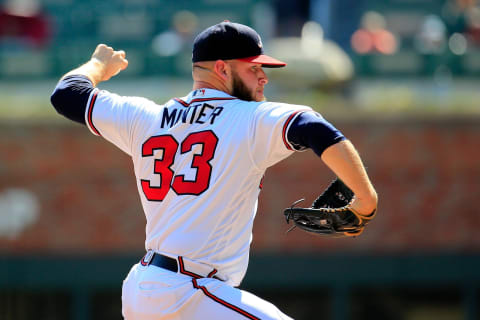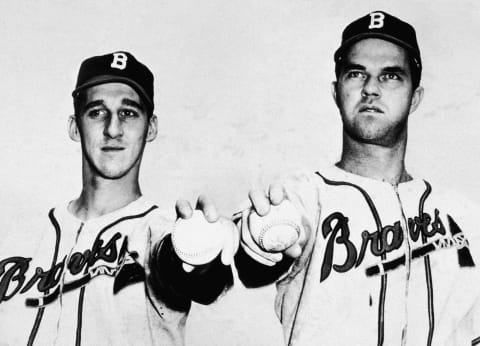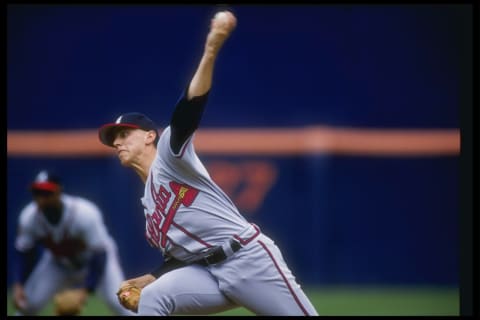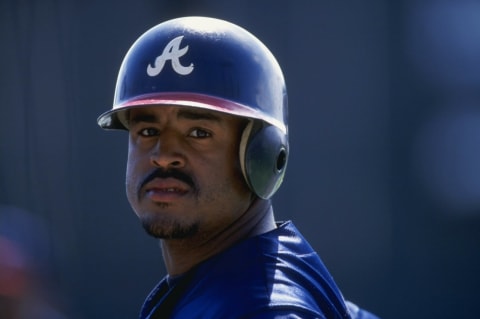Atlanta Braves Opening Day countdown: 33, collection


The Atlanta Braves have had a number of interesting players that have worn the number 33. Let’s look at a few!
While there is one notable statistic with the #33 associated with it in Atlanta Braves franchise history, more intriguing is the collection of players that have worn the jersey over the franchise’s history, and we’ll highlight a few here.
First, we’ll start with the statistical mention.
Big loser
We’ve already discussed the 49 victories that John Clarkson recorded in 1889. In a different era of pitching, it was not uncommon for a pitcher to make 60-70 starts in a year and get a decision in every one of them.
Jim Whitney, also known as “Grasshopper Jim” broke into professional baseball with the Boston Red Stockings in 1881 and made 66 appearances, 63 of them starts. He led the league in those categories, as well as 57 complete games, 552 1/3 innings, and 31 wins.
The number we’re recounting here, however, is probably the least desirable of the 10 statistical categories that Whitney led the National League in for the 1881 season as he was credited with 33 losses.
To say that’s a franchise record that will never be broken is an understatement. The Atlanta Braves have not even had a starter even make 33 starts in a season since 2015, which just gives an indication of how different the environment is now around the game.
Whitney was a fairly accomplished hitter when he wasn’t on the hill, and in 1882, he’d sport a .323/.382/.510 line. Overall, he hit .270/.316/.393 while a member of the Boston club, hitting 13 home runs over 1,603 plate appearances. He never had a season again like the 1881 year, but he did win 133 games with Boston over 5 years, tossing 2,263 2/3 innings with a 2.49 ERA.
Let’s take a look now at some of the intriguing players who have worn #33 for the Atlanta Braves franchise, starting with a pair of big-time arms in the 1940s and 1950s that were actually traded for one another…

Pray for rain
The old phrase in the 1940s for the Braves was “Spahn and Sain and then pray for rain”. Johnny Sain made his debut in 1942 with the Braves before serving three years of military service.
When he returned in 1946, he had the first of what would be four 20-win seasons in the Braves rotation, leading the National League in complete games with 24. In 1948, Sain was worthy of the World Series MVP in a losing effort as the Braves fell to Cleveland. He made two starts, completing both, tossing 17 innings without walking a single batter and striking out 9, allowing just 2 earned runs in total, though the team went 1-1 in his two starts.
In parts of 7 seasons with Boston, Sain went 104-91 over 1,624 1/3 innings, posting a 3.49 ERA and 1.32 WHIP. He was selected as an All-Star twice and finished as high as second (1948) in MVP voting in the days before the Cy Young Award.
Sain to Lew
In the 1951 season, the Braves traded Sain to the New York Yankees straight up for a young righty by the name of Lew Burdette. Burdette would spend the next two seasons primarily serving as the Braves long man as they transitioned to Milwaukee. He joined the rotation in 1954, and he was a fixture in the Braves rotation from that point for a decade.
Lew made three All-Star teams, in 1957 and 1959 (2). He also won 20 games twice for the club. However, it’s his performance in the 1957 World Series that will always have Burdette as one of the team’s legends. He won the World Series MVP as the Yankees were taken down by the Braves in seven games. The Braves won all 3 of Burdette’s starts, as he tossed 3 complete games, allowing just 2 earned runs over 27 innings.
He would spend parts of 13 seasons with the Braves, finishing with a 179-120 record and a 3.53 ERA over 2,638 innings.
Now to a couple notable more recent arms…

Doyle
Doyle Alexander had two trips through the Atlanta Braves franchise. His first was during the 1980 season when he won 14 games over 35 starts and 231 2/3 innings before he was traded to the Texas Rangers.
In his second tour of duty, he spent a total of about one full season with the Atlanta Braves spread across the 1986 and 1987 seasons. At that point, he was 35 and 36 years old, so he was at the end of a 19-season major league career.
He’s most notably known as the trade piece that got the Braves John Smoltz, as that was the return when he was traded in the summer of 1987. Few remember just how good Doyle was down the stretch for the Tigers that year, as he went 9-0 with a 1.53 ERA over 11 starts to propel the Tigers into the ALCS.
Babyface
Known for his youthful look (though he was just 20 when he broke in with the Atlanta Braves), Steve Avery was the #3 overall selection in the 1988 draft out of high school in Michigan. He moved quickly through the farm system, struggling in his 1990 debut, but along with the rest of the club, he produced big in 1991, going 18-8, tossing 210 1/3 innings with a 3.38 ERA at just 21.
Avery’s career sadly would become one of tragedy. After making his first All-Star game in 1993 when he won 18 games and posted a 2.94 ERA, he seemed to struggle to locate and could never stay healthy and keep the ball in the zone again after that. The Atlanta Braves let him go in free agency after the 1996 season, but he would not ever have an ERA under 5 again in the major leagues.
From 1991-1993, Avery won 47 games and posted a 3.17 ERA over 667 1/3 innings as he was between 21 and 23. However, with his struggles, by the time he left in free agency, Avery’s career line with the Atlanta Braves was 72-62 over 1,222 1/3 innings with a 3.83 ERA.
Last, one very notable hitter to don the jersey…

A true star athlete
The Atlanta Braves have been no strangers to star athletes over their franchise history. Deion Sanders famously played for both the Falcons and the Braves in the same weekend in 1992.
Though he never played both at the same time, Brian Jordan was another player who was quite good in two sports. A very good strong safety in the early 1990s with the Atlanta Falcons, he gave up football to focus on baseball after the 1991 season.
The decision paid off as he made the St. Louis Cardinals for the first time the next season. He made a big impression the following season and finally earned a fulltime job in 1995, pounding out 22 home runs while hitting .296. He dialed that up in 1996, hitting .310 and driving in 104 runs for the Cardinals.
More from Tomahawk Take
- Braves News: Braves prospect rankings, Correa deal with Mets at risk, more
- Why the Atlanta Braves won’t extend Max Fried
- Atlanta Braves 2023 Preseason Top 30 Prospects List: 1-5
- Braves News: Braves acquire Diaz, moves around the division, more
- Atlanta Braves 2012 Top Prospects Review: J.R. Graham
After a 1998 season when he hit .316 with 25 home runs and 17 steals for the Cardinals, he was signed by the Atlanta Braves in free agency.
The signing paid immediate dividends as Jordan made his only career All-Star game in 1999, hitting .283/.346/.465 with 23 home runs, driving in 115 runs. After slumping in 2000, he put up nearly equal slash and power numbers in 2001 for the Braves.
After the 2001 season, Jordan was part of three players that the Atlanta Braves sent to the Dodgers to acquire outfielder Gary Sheffield. He would return for his final two seasons of his career in 2005 and 2006.
Over 5 years with the Braves, he hit .275/.327/.443 with 71 home runs in 558 games.
Touki the rotation answer?. dark. Next
Hopefully, you’ve enjoyed this look back and are getting psyched up for the Opening Day of the 2019 season as we enjoy the first game of Spring Training today!!